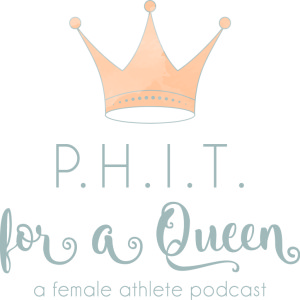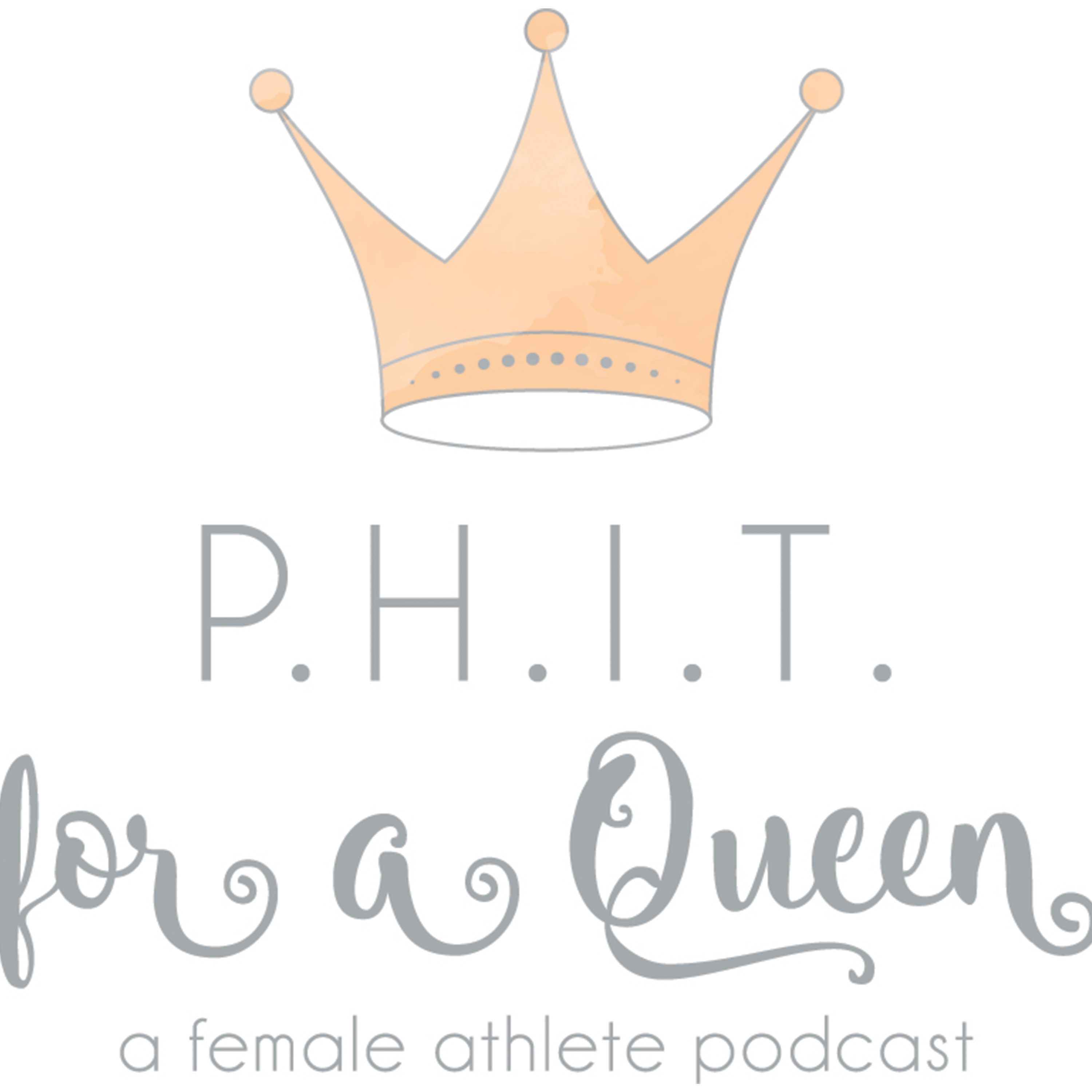Episodes

Friday Oct 26, 2018
Dr. John Sullivan shares why “The Brain always Wins” on PHIT for a Queen
Friday Oct 26, 2018
Friday Oct 26, 2018
Dr. John Sullivan shares why “The Brain always Wins” on PHIT for a Queen

- The Brain is the Governor connected by the vagus nerve
- The brain hasn’t been viewed as cool because we don’t tell a good story about it.
- Why we should view mental health as brain health- “we don’t know what human consciousness is”
- Breath rate manages heart rate which also manages the brain.
- Shares how brain management starts with PROCESS- listen to find what those stand for
- When you can regulate heart rate and respiration rate you can regulate emotion.
- Leaving you to be able to “see and do” emotion regulation, pattern recognition.
- What if we viewed nutrition as the messages received to optimize brain health and function versus physical function? - “nutrition is neurotransmitters. “
- Does our lack of social connection- eye to eye, hand to hand impact our brain health?
- http://www.thebrainalwayswins.com/home.html
- https://www.amazon.com/Brain-Always-Wins-Improving-Management/dp/1909273732
- Some of the proceeds go back to the military where they can continue to study the brain and the impacts on war.

How you know he is legit:
Dr. John P. Sullivan is a Sport Scientist and Clinical Sport Psychologist. He has over twenty years of clinical and scholarly experience, including his work with the New England Patriots in the National Football League (NFL) for sixteen years assisting with the coordination of sport science and clinical care. Dr. Sullivan’s experience also includes such work within the National Basketball Association, Major League Soccer, British Premier Football League, Premier Rugby League, Australian Football League, and Olympic national teams. He is an expert consultant for the elite military of the Department of the Navy and law enforcement in regard to performance and welfare needs.
As the Clinical Sport Psychologist/Sport Scientist for Providence College and the University of Rhode Island, he maintains positions in Sports Medicine and Sport Science. He is also the Assistant Director of the South County Sports Medicine Concussion Clinic in Wakefield, Rhode Island.
Dr. Sullivan is a visiting scholar/sport scientist at the Queensland Academy of Sport (QAS)/Australian Institute of Sport (AIS) in Brisbane, Australian, examining the current state sports technology in the marketplace and its utility as well as concussion rehabilitation, cognitive training in sport, and sport recovery. He is also a visiting professor and researcher at Queensland University of Technology within the Institute of Health and Biomedical Innovation, Psychology, and Neuroscience departments focused on projects in athlete health, human performance, and neurophysiology (brain-based performance). Domestically, Dr. Sullivan also serves as an Instructor/Supervisor for Brown University Medical School Sports Medicine Fellowship.
He provides consultation to the NFL office on issues related to well-being and performance and is a member of the mental/behavioral health advisement group. Dr. Sullivan was one of five national experts identified by the National Collegiate Athletic Association (NCAA) to provide expert contribution to new guidelines for the NCAA Sports Medicine Handbook, and he is the co-lead author for the interdisciplinary consensus statement regarding the treatment of mental health issues with student-athletes, which is sponsored by the National Athletic Trainers Association (NATA) and the NCAA. Dr. Sullivan also serves as a Scientific Advisory for five sport technology companies providing support and oversight throughout the development process.
Dr. Sullivan is a national and international practitioner-researcher who conducts central nervous system (CNS) measurement/assessment, performance optimization, testing, talent selection, recovery training, and concussion assessment/rehabilitation. He has established expertise in psychophysiological profiling and developing cognitive abilities (e.g., decision making, complex reaction time, and read-and-react abilities) of elite performers. Dr. Sullivan uses various markers such as, Central Nervous Systems Assessment - DC Potential, Heart Rate Variability (HRV), Electroencephalography (EEG), Accelerometry/GPS, Multiple Object Tracking (MOT), Optic Flow (OF), and biofeedback to determine optimal training loads, recovery interventions, and maintaining as well as enhancing cognitive capabilities in performance environments.
He is a frequent contributor writing on sport science and sports medicine for peer review journals and popular press (Australian Financial Review, The Atlantic, BBC Sports, ESPN, the Guardian, Huffington Post, New York Times, the Daily Morning Telegraph, the Telegraph, Sports Illustrated, and the Sydney Morning Herald). He has also co-authored a book focusing on the latest cognitive science and neuroscience related to optimal brain performance entitled The Brain Always Wins (Urbane Publishing London UK Ltd).
He has co-authored three recent chapters; the first on the merging of technology, neuroscience, biofeedback, and sport/performance psychology in Sport psychology: On the way to the Olympic Games; and the second chapter focusing on well-being and mental health issues in athletes within fundamental concepts in sport and exercise psychology; A project sponsored by the International Society of Sport Psychology, and the third chapter for the American Psychological Association (APA) book - Career Paths in Psychology: Where Your Degree Can Take You 3rd edition - focusing on working in sport and the role of Sport Psychologists and properly defining the title, role, and credentials.

Friday Oct 19, 2018
Athletes are Humans! Performance Anxiety in Sport with Dr. Lonnie Sarnell.
Friday Oct 19, 2018
Friday Oct 19, 2018
Dr. Lonnie Sarnell tackles the world of mental health issues in sports, particularly performance anxiety and the overlap between anxiety and disordered eating.

* Athletes are humans and struggle with mental health issues! The thoughts around mental health and anxiety are that if we struggle with it it's a personal failing versus something that is extremely prevalent and can be treated. Lonnie tackles myths around mental health in the sports world.
* The average delay between onset symptoms of mental illness and intervention can be 8 to 10 years.
* We need a little anxiety to help with motivation and performance but when anxiety and stress lead to suboptimal performance, that's when it can become a problem.
So you know she’s legit:
Lonnie Sarnell, Psy.D. is a licensed clinical psychologist who provides clinical and sport psychology services to adolescents and adults. Dr. Sarnell has experience working with a wide range of concerns, including anxiety, depression, academic stress, life transitions, eating disorders, and relationship concerns. Dr. Sarnell specializes in peak performance and anxiety management. She has worked with athletes at all levels, including high school, college and professional athletes. Dr. Sarnell completed her B.A. in psychology at Yale University, where she played as a goalie on the Division I women’s lacrosse team. Dr. Sarnell received her Psy.D. in clinical psychology with a concentration in sport-performance psychology from La Salle University, where she provided sport psychology services within the athletic department. She completed a pre-doctoral internship and post-doctoral fellowship at the University of Delaware’s Center for Counseling and Student Development, where she consulted with Student Services for Athletes and provided sports psychology and personal counseling services for students. Dr. Sarnell’s post-doctoral specialization areas were performance anxiety and eating disorders. From 2013 – 2016, Dr. Sarnell worked at the Metropolitan Center for Cognitive Behavior Therapy, a private practice on the Upper East Side of New York City that specializes in the treatment of anxiety.
Connecting with Dr. Sarnell:

Friday Oct 12, 2018
Friday Oct 12, 2018
Michelle Cordero shares with us “How she uses a holistic approach when taking care of her athletes.“
- Athletic Trainers are part of the Sports Medicine team and are usually the first to the athlete when injured.
- Also are behind the scenes to prevent injuries from happening.
- Share what puts the female athlete at risk for injuries- training, nutrition, maintenance.
- The goal is to break down the injury to relatable terms so they can understand what is going on to their body.
- Avoid generalizations and bring back information put into context.
Check out Michelle’s Facebook community- Athlete Remedy
So you know she is Legit:
Michelle A. Cordero is a Certified Athletic Trainer and Corrective Exercise Specialist in Miami, Florida. She was mentored by the leading expert in heat illness in the United States while pursuing her degree at the University of Connecticut as well as learn from top educators in the field. She went on to pursue her Master's Degree in Sports Medicine at Florida International University where she began her medical coverage with young athletes in the high school setting.
She has a passion for sports and loves nothing more than to help athletes overcome their struggles and get back to competition. Michelle has been the Head Athletic Trainer for the 5-time State Champion and 2-time Dick’s National Champion Girls Basketball team in Florida and has worked with elite level athletes in the U18 and U20 Women’s National Soccer Team. Although her primary practice has been working with student-athletes in middle and high school, Michelle has also worked with collegiate, professional, and high-level athletes in multiple sports as well as been part of the medical staff with the FC Barcelona Escola: an International academy based in Barcelona, Spain that holds soccer camps worldwide.
She is the creator of Athlete Remedy, a website devoted to empowering and educating sports parents and athletes with practical tips and guidelines for preventing, treating, and recovering from sports injuries in a language that YOU can understand! She strongly believes in providing a user-friendly approach that cuts to the chase and isn’t full of big scientific explanations. She leads a growing online community of sports parents by providing insight and filling in the gap in the world of sports injury treatment and recovery with weekly training, LIVE Q&A, and injury consultations.

Thursday Oct 04, 2018
Hollaback! To Street Harassment with Emily May
Thursday Oct 04, 2018
Thursday Oct 04, 2018

Emily May, the co-founder of Hollaback!, a global, people-powered movement to end harassment, joins us to discuss the issue, how to respond to harassment and how we can be a part of creating a safer community.
- Emily explains what street harassment is: sexual harassment that happens in a public space; a whole spectrum of behavior that is a product of sexism and racism. Everywhere across the world it exists and it is a problem! Youth are even more at risk, the majority of young women will have experienced street harassment by age 12.
- Street harassment might feel like a normal thing that we as women have to tackle when we are out there on a run, but it isn’t normal. If someone says something derogatory in the workplace there are systems in place to prevent this from occurring but not in public places. This makes consequences for the harasser difficult to enforce.
- There is no perfect response to a harasser. Emily shares tips on how to respond in these situations.
So you know she’s legit:
Emily is an international leader in the gender justice movement. In 2005, at the age of 24, she co-founded Hollaback! in New York City, and in 2010 she became its first full-time executive director.
Under her leadership, the organization has scaled to over 50 cities in 25 countries and launched HeartMob, Hollaback!’s platform designed to support people being harassed online, and The People’s Supper, a collaboration designed to bring people together to repair the fissures in our relationships, heal, and bridge difference. Emily believes that by having each other's backs in deep and meaningful ways, we can disrupt cycles of hate and create a world where everyone has the right to feel safe and confident.
Prior to running Hollaback!, Emily worked in the anti-poverty world as a case manager, political action coordinator, director of development, and most recently, a one-woman research and development team. She has also worked on four political campaigns. Emily has a Master’s Degree in Social Policy from the London School of Economics, is an Ashoka Fellow, a Prime Movers Fellow, and has won over ten awards for her work including the TEDCity 2.0 Prize.
Connecting with Emily and Hollaback!




